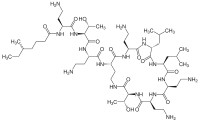
Photo from wikipedia
Background Colistin is a potentially nephrotoxic antibiotic used for the management of multidrug-resistant bacterial infections in critically ill patients. Co-administration with other nephrotoxins was reported as a potentially modifiable risk… Click to show full abstract
Background Colistin is a potentially nephrotoxic antibiotic used for the management of multidrug-resistant bacterial infections in critically ill patients. Co-administration with other nephrotoxins was reported as a potentially modifiable risk factor of colistin acute kidney injury. Objective To establish the role of colistin dosing and co-medications in development of colistin kidney injury. Setting Community teaching hospital in Latvia. Method Adult patients from intensive care units with diagnosed Gram-negative bacterial infections, undergoing colistin treatment for longer than 72 h, and not receiving renal replacement therapy were included in this retrospective study. Main outcome measure Colistin nephrotoxicity was defined as an increase in the serum creatinine level by at least 50% from the baseline after ≥ 48 h. Results In 73 of 87 cases, Acinetobacter baumannii pneumonia was diagnosed. The nephrotoxicity rate was 27.6% with a median onset of 8 days. In 79% of the cases, colistin was co-administrated with at least one potentially nephrotoxic agent. The most used nephrotoxins were loop diuretics (44 cases), non-steroidal anti-inflammatory drugs (19 cases) and vancomycin (11 cases). The use of nephrotoxins was similar in patients with colistin nephrotoxicity (group-1) and without it (group-2). Carbapenems were more common in group-2 (37% vs 62%, p = 0.004) and a colistin loading dose of 9 MU in group-1 (87% vs 62%, p = 0.027). However, in the multifactor regression analysis, the protective role of carbapenems was not confirmed. Conclusion Potentially nephrotoxic agents are commonly co-administrated with colistin. This study failed to prove their role in the development of acute kidney injury.
Journal Title: International Journal of Clinical Pharmacy
Year Published: 2020
Link to full text (if available)
Share on Social Media: Sign Up to like & get
recommendations!